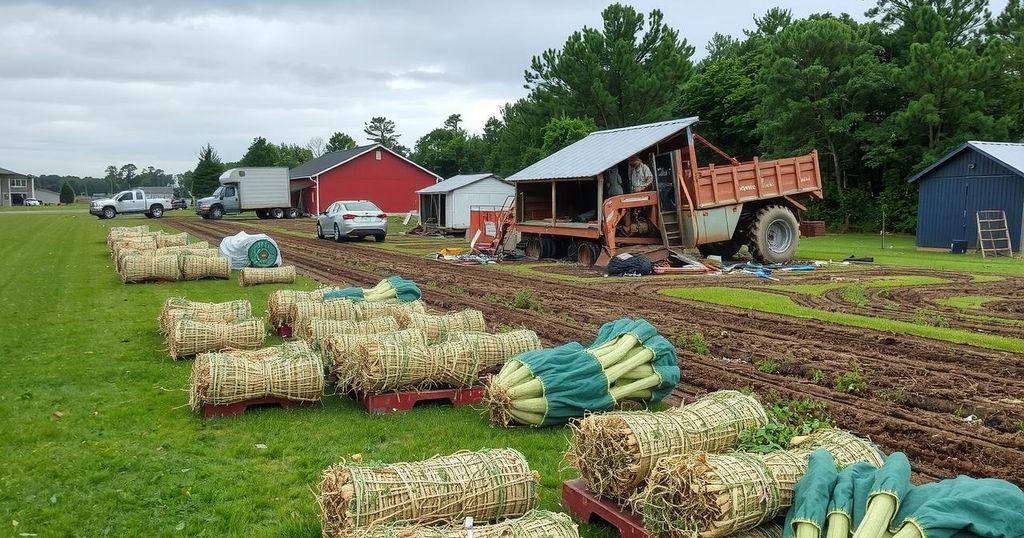Georgia Farmers Remain Devastated by $5.5 Billion Losses from Hurricane Helene
Georgia farmers report losses of at least $5.5 billion due to Hurricane Helene, which made landfall as a Category 4 hurricane in September. The storm devastated crops, particularly cotton and poultry operations, leaving farmers questioning their future amid a slow recovery process. Federal and state aid is being allocated, but the economic strain remains significant.
In the aftermath of Hurricane Helene, Georgia farmers continue to face significant losses totaling at least $5.5 billion. The storm, which made landfall in September as a Category 4 hurricane, wreaked havoc across the South, causing extensive damage to crops, timber, and farm equipment. Chris Hopkins, a farmer in Toombs County, described the emotional toll of the disaster as he still struggles with the aftermath of his broken irrigation systems and damaged crops. Experts project that the total damage could exceed $10 billion across affected states.
The impact of Hurricane Helene is especially pronounced for cotton growers like Mr. Hopkins, who experienced a loss of approximately 50% of his cotton crop. This loss is compounded by the destruction of pecan orchards and the significant costs of debris removal and equipment repairs. The comprehensive economic impact includes losses in other states, with North Carolina suffering approximately $3.1 billion, while Virginia, South Carolina, and Florida also faced multi-million dollar losses in agriculture and related industries.
Recovery efforts have begun, with Georgia’s government reallocating $100 million towards emergency loans for farmers, while federal aid is also amidst legislative discussions. Many farmers are questioning their future in agriculture due to the extensive damage and the slow pace of recovery. As they grapple with rebuilding, agronomists believe that consumer prices may not drastically increase because of alternative crop sources elsewhere, though pecans may be an exception due to Georgia’s significant share of the U.S. market.
The long-term outlook for the sector remains uncertain, with many farmers still reeling from the compounded effects of this hurricane on top of the already challenging agricultural market conditions. Farmers like Jeffrey Pridgen, who lost critical infrastructure for poultry production, face a bleak two-year recovery period, underscoring the profound impacts of natural disasters on the farming community.
Hurricane Helene was one of the deadliest storms to hit the U.S. in nearly two decades, bringing destruction across multiple Southern states from Florida to Virginia. The storm’s aftermath has revealed the vulnerabilities within the agricultural sector, particularly for farmers heavily reliant on crops susceptible to severe weather events. This disaster has resulted in a significant economic strain, pushing local economies into a precarious state of recovery. The federal and state governments are responding with aid, but the path to recovery for many farmers remains fraught with challenges.
The repercussions of Hurricane Helene are profound and multifaceted, leading to financial hardship for Georgia farmers and those in surrounding states. While some aid is becoming available, the emotional and economic toll on the agricultural community is substantial. As farmers assess their losses and contemplate rebuilding, the long-term sustainability of their operations hangs in the balance, making their recovery a focal point for broader agricultural policy discussions moving forward.
Original Source: ktxs.com




Post Comment